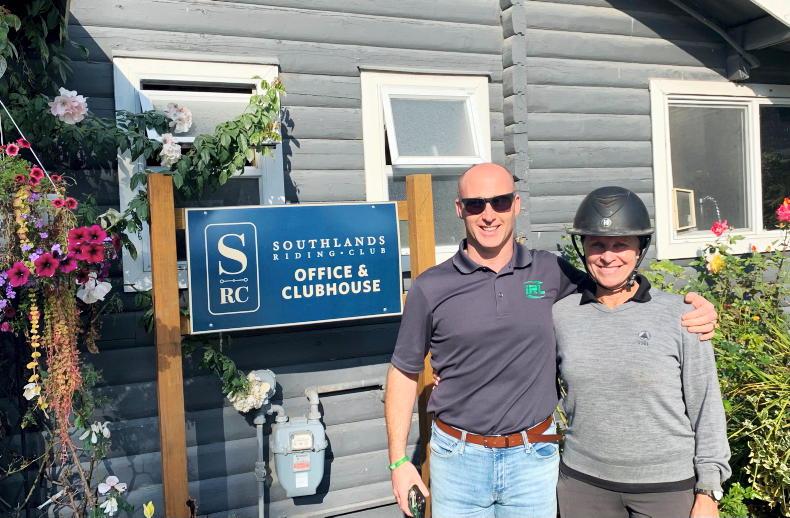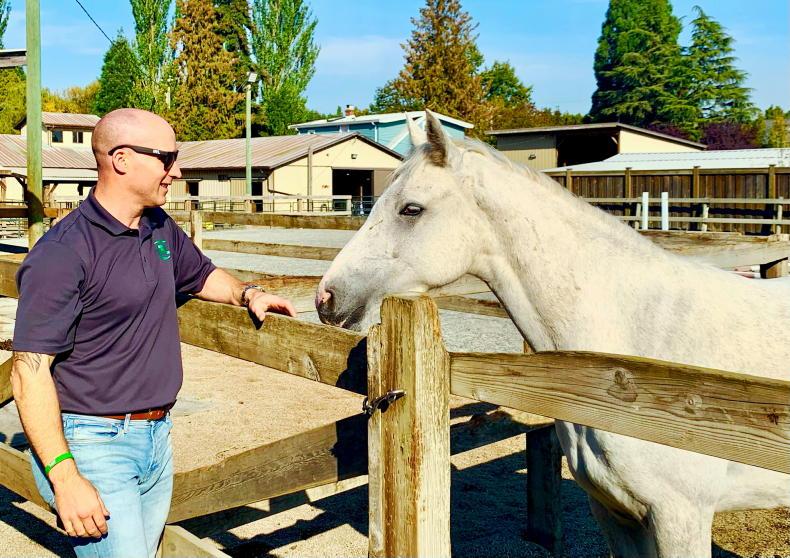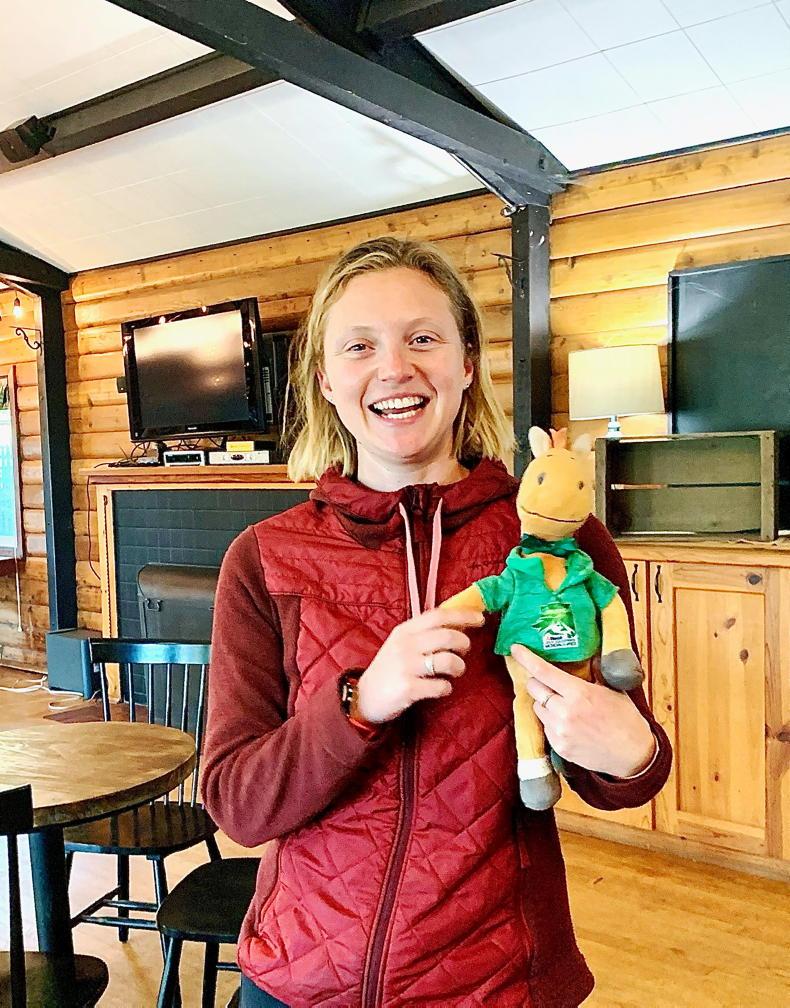EVERYONE goes to her when anything is wrong. Everyone knows Margot, she’s as straight as a die,” said William Donnellan, describing the lady, waiting patiently for us on a bench outside the Southlands Riding Club office.
Southlands Riding Club is the unique riding facility, south of Vancouver city where Craughwell-born Donnellan and his wife Laura have settled since 2009. Horses were always going to follow him across the Atlantic and this 16-acre site is where he and some 300 other members school, train and compete their horses, kept at nearby livery yards.
A not-for-profit venture, the Southlands training and competition base offers both indoor and covered arenas, a cross-country course, plus outdoor arenas where half a dozen shows are held during the summer. Not to mention a range of charity activities, hosting Vancouver Pony Club rallies and even a wedding!
Then, before Covid-19 came along, there was the annual Southlands Country Fair, billed as “a day in the country without leaving the city”. As well as the usual pony rides and face painting, the attractions include a farmers market, book sale, a silent auction, beer garden, heritage displays and bouncy horses.
Similar to Clarecastle Show this summer, a donation replaces admission fees and family activities are mostly free or cost from as little $1 to a maximum of $5. A portion of each year’s proceeds go to charity while the balance is used to support this non-profit society, set up in 1943.
“It is unique,” agreed lifetime Southlands resident Margot. Known as the “Mayor of Southlands”, she is a recipient of the 2018 Horse Council BC Volunteer of the Year award and has even been known to dress up as the fox for the Club’s annual New Year’s Day drag hunt.
“It was bought by a group of young men that were playing polo and was called Southlands Riding & Driving Club. We used to be a driving club, then a polo club, now a riding club. We have polo, cross-country, show jumping, we have hunter and dressage and we also host riding for people with disabilities, it’s called the PRDA (Pacific Riding for Developing Abilities) programme.”
Another important element is the Club’s involvement with a scheme for at-risk youth from the inner city. “They come down here because the fact of being around horses is therapeutic, both mentally and physically,” she noted about the benefits of such schemes.
“We have the rescue horse programme. What we’ll do is we’ll rescue horses or bring in young horses, we’ll train them or rehabilitate them and then sell them.”
Where are these horses found, at auction or Canada’s version of Craigslist classifieds? “It could be anywhere. There’s usually a riding instructor that takes them under their wing and their student works with the animal. It’s all done voluntary.”
Olympians
“There are no horses stabled on-site, except the rescue horses. The outlying areas don’t all have a ring or a cross- country course and different footings, it’s off the charts,” she remarked about the prohibitive cost of adding or acquiring such extras with Vancouver’s spiralling property prices.
“Members can come here and use the facilities, cross-country, the arenas. This was the polo field. Its gotten smaller and smaller, to the point now that they have a once-a-year fundraising exhibition game but they only play three-a-side, instead of four,” said this keen polo players, pointing to the grass arena where three riders are schooling their horses, watched on by a brazen coyote perched on the bordering ditch.
Also on the arena’s perimeter is the Donnellan’s Irish Pub mobile bar, open for business during competitions.
The Southlands Riding Club client base, is it professionals, happy amateurs, beginners?
“It’s really a combination of all those, I think there’s a lot of grassroots getting started because we are so visible, being close to the city and people find out about the area and want their children to learn to ride. Some carry on, some just do it recreationally and we have produced quite a few Olympians. We don’t strive to be Spruce Meadows or Thunderbird, we’re not that! We’re a private riding club, although we do host competitions here.”
“Thunderbird is a top-class venue, that’s less than an hour away, in Langley, BC. Eddie Macken was living up the street from there before he moved to Whistler. He’s a very good skier, I believe!” added William, about the Longford legend’s move to Canada’s famous ski resort.
Alberta, British Columbia’s eastern neighbour, is Canada’s horse capital with one-third of Canada’s estimated 500,00 horse population located in this province. And Canada has certainly produced Olympians, including “Captain Canada” himself, Ian Millar, who holds the record for the most Olympic appearances (10) by any athlete.
Two more Canadian Olympians are three-time team member Eric Lamaze who won individual gold at Hong Kong with Hickstead and eventer Peter Barry who competed Kilrodan Abbott at London.
Lamaze’s first good horse Cagney, inducted into Jump Canada’s Hall of Fame, was a full-brother to Macken’s Sky View. Both horses were bred by their sire’s owner, Philip Heenan. Kilrodan Abbott, or ‘Eddie’ to his legion of Canadian fans, was by the Clover Hill son Clover Brigade and bred by Michael Hogan, near Nenagh.
According to 2020 statistics, 855,000 Canadians are involved in the country’s equine industry of which 550,000 live in horse-owning households. 300,000-plus don’t own a horse, a fact borne out amongst the Southlands membership base.
“For a lot of people, one person would own the horse and then they would have someone half-lease the horse, just to cover the costs. There’s some families that have multiple horses, there’s some situations where the riders use lesson horses or one horse shared between two people and then at the higher end, competition horses that are imported from Europe and the sky’s the limit.”
Pricey
“Quite a number of horses are off-the-track racehorses that are being reschooled to be jumpers, eventers or dressage horses,” Margot continued. “I’m a huge fan of the breed. I have two of them myself, one of them is off-the-track, I play polo, he does cross-country, he goes hunting.
“His racing name is Eye Candy but I call him Candy. In fact, I changed his name to Margot’s Eye Candy which is a sore point with my husband!”
Same as with property prices, horse life in Vancouver does not come cheap. “I think the going price of a horse in livery - and that’s to have them fed, mucked and they have a stall and a paddock - is somewhere between 1,000 and 1,500 Canadian dollars (approx €725-€1,085) per month. Then there’s DIY livery, or all kinds of different scenarios where the staff do the feeding and you do your own mucking out.
“We have been losing stalls as people buy local properties and don’t wish to have horses, so it’s getting pretty tight to keep a horse down here. So the prices have gone up.
“And also, we have not had a good harvest. We’ll have trouble with our hay this season because we were in kind of a drought situation. We had terrible rain at the start of the year, we got a late start and now we got no rain, so I don’t know what the hay situation will be. We have rectangular bales and local hay would be about 15 dollars a bale.”
“That [Canadian dollar price] would be about €12, the bottom of the barrel. I didn’t believe how expensive it was when I got here and even putting shoes on horses. For Lulu, because she’s got big hooves, that would be over $300 for a set,” William remarked on the cost of shoeing his Irish import, bred by his father-in-law Mike Newell.
“The cost of farriers and vets travelling is huge,” said Margot, listing two more expenses “because obviously we don’t have many living in the city, so they come in from the valley and our gas prices have been astronomical. That has to factored into their cost as well. It is not a cheap hobby!”
And then there’s Southlands Riding Club membership fees. “We have riding memberships and a lot of social memberships for non-riders, for people who just want to be in the know. There’s adults, juniors and intermediates and then there’s a Golden Age too. We’ve all different categories,” explained Margot about the range of memberships.
Fees run from an introductory offer of $587 for three months membership for first-time members up to the top tier for senior members (21 to 64 years of age). That costs $1,973 for the current year, plus a $1,000 initiation fee. Or around €2,150 in total.
How are those fees spent? The funds are ploughed back into maintenance, arena surfaces, upgrading to LED lighting, new jumps, electricity, property taxes and 101 sundry expenses. With over 300 members, the Southlands Riding Club members evidently feel they’re getting value for money in the metro area.
New kid on the block
We’re heading back to the cosy wooden clubhouse where we meet Katleen Chateau, originally from the Bordeaux region in France.
“I used to work for a large facility in south-east France, doing all the shows and marketing, then I moved to Canada five years ago and I’ve been in Vancouver for four years. Southlands is an equestrian neighbourhood, we don’t have anything quite like this in France or Europe.

“I’m the Club co-ordinator, so that includes managing the numbers, organising the shows and social events. Usually after the shows, we’re trying to bring our club nights back after Covid and then we have a Christmas holiday market at the end of November.
“We were open during Covid as people needed somewhere to be with their horses, because it was dangerous to be on the road, so we were lucky. In fact 2020 was our best year. All the other facilities, but ours, were closed as we don’t have horses on-site.”
Was their set-up similar to the SJI’s allocated time slots for competitions? “We had specific times, not as precise as you describe but the members had to come, jump their round and go.”
Many of the estimated 300 horses in this neighbourhood, “from McCleery Golf course three blocks west to the Point Grey golf course,” are stabled nearby so the next stop, along roads lined with tidal ditches, is Shannon Stables, “owned by May Nolan from Co Clare and Stuart Carmichael.”
We’re here to meet Margot’s Eye Candy and ‘Rudi’, a new arrival sourced by William. “I bought him from Grace and William McMahon in Craughwell, who’d be neighbours of my wife back home. A lady here asked me to source a Connemara Pony for her and they had exactly what she wanted.”

Gleann Rua Rudi at his new Shannon Stables base. Pictured with William Donnellan \ Susan Finnerty
His breeders are equally happy the pony has landed on his hooves in his new Canadian home. “His name is Gleann Rua Rudi and he is by Loughfadda Rudi and out of one of our resident mares Green Rua Emily Rose, by Gleann Rua Maxwell. It was lovely to be able to handpick a really nice home-bred from our herd to send over to William in Canada,” Grace said.
Off-road hacking around this neighbourhood is enhanced by the Deering Island Park trails that run alongside the Fraser River. A massive barge, with a load of gravel and JCB on board, is being towed towards Vancouver while in the nearby distance, a jet lifts off from Vancouver International Airport.
Voted Canada’s cleanest airport in the Sky Trax Airport Awards, Vancouver is Canada’s second-busiest airport (after Toronto) with an average of 17 million passengers per annum. Passenger numbers have bounced back from seven million in 2020, a massive drop from the previous year’s figures of 26 million passengers.
“That area near Richmond and the airport is almost below sea level,” remarked William as we turn back towards the city centre, leaving behind seven-figure mansions, Southlands Riding Club and the ‘Mayor of Southlands’ Margot Vilvang.
Next week part III: IRL


 This is a subscriber-only article
This is a subscriber-only article
 It looks like you're browsing in private mode
It looks like you're browsing in private mode







SHARING OPTIONS: